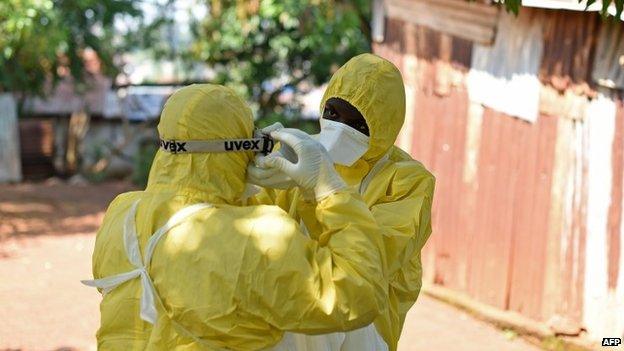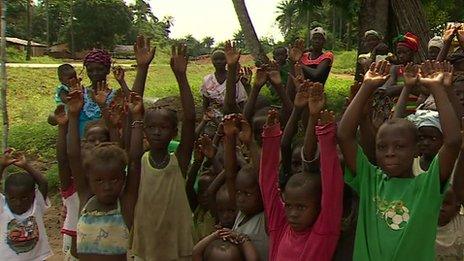Ebola crisis: Struggling to change behaviour in Sierra Leone
- Published
Why is the number of Ebola infections continuing to increase in Sierra Leone? Andrew Harding found four "stark" reasons at a village near Freetown
For weeks it has been the same here in Sierra Leone's capital, Freetown. Every day the Ebola burial teams - now well organised and promptly dispatched - collect about 60 bodies from around the city and its crowded suburbs.
Some days it is 50, sometimes as many as 80.
About 20% of those bodies turn out to be Ebola cases. The rest are just the usual range of deaths you might expect in a large city in West Africa. Every death is now treated as suspicious.
There is an air of brisk efficiency at the workers' base - the British Council offices, on a hill overlooking the Atlantic Ocean, now transformed into an Ebola command centre for the western region of Sierra Leone.
Calls are logged, white boards filled, statistics for the past month collated by close-knit teams.
Down the hill, at the municipal cemetery, bulldozers are busy clearing new ground, scraping away mounds of rubbish to give the gravediggers more space.
"At the moment we're having some success in holding on to the epidemic and I don't see the more astronomical predictions coming through at the moment," said British army Colonel Andy Garrow.
Dying at home
And yet, as the weeks go by and the body collection teams continue to bring in the same number of corpses, Col Garrow finds himself drawn increasingly to one particular conclusion.
"Behaviour change," he says. Or rather the lack of it.

Sometimes suspected Ebola cases are not reported to the health authorities
Here is the problem: By now, everyone knows about Ebola; and nobody with symptoms should, logically, be dying at home or on the street anymore.
They should all have been taken to hospital.
But to understand why that is not happening, all you have to do is drive to any of the impoverished suburbs of Freetown.
Mariatu Kamara had been hiding her illness for several days.
When we found her outside her home in Rogbangba village only a few people knew she was sick - a headache, sore bones and boils on her head and legs.
Perhaps it was not Ebola. But if it was, her three young children - one tied to her back - were at grave risk.

This Freetown graveyard shows "the almost industrial scale" of the Ebola crisis, reports Andrew Harding
Ebola burials
Bodies still contain high levels of the Ebola virus
At least 20% of new infections occur during burials, WHO says
Relatives perform religious rites including touching or washing the body
Safe burial process involves observing rituals differently, such as "dry ablution"
Volunteers with full protective clothing are trained to handle and disinfect bodies

"I don't have a phone," Ms Kamara explained at first, when I asked her why she had not contacted the Ebola telephone hotline.
But she became visibly alarmed when I suggested we could help.
"I can't leave my children here on their own," she said. Her nine-year-old daughter, Aisatu, began to cry.
The village headman, Abdul Karama, arrived and promptly called 117 to report a possible Ebola case.
He was worried that it would not make a difference. "We call, but sometimes nobody comes," he said, citing other instances.
Ignoring quarantine
A few doors away, Rogbangba village revealed another problem - quarantine.
Fifteen-year-old Aminata Bangura died last week of suspected Ebola.
The rest of her family - 11 people - were promptly told to stay indoors. Food parcels were delivered to help them out.
But it was quickly obvious that the family were ignoring the quarantine order.
We saw Ms Bangura's brothers emerging from a crowded mosque across the dirt road.
"It's lonely at home. I go to the mosque because I don't know how to pray on my own," said 22-year-old Ibrahim Bangura.
He continues to run a hairdressing business from a nearby wooden shack.
Ebola deaths
Figures up to 13 January 2016
11,315
Deaths - probable, confirmed and suspected
(Includes one in the US and six in Mali)
-
4,809 Liberia
-
3,955 Sierra Leone
-
2,536 Guinea
-
8 Nigeria
The local headmaster - now out of work because the schools are closed - has become a fervent anti-Ebola campaigner and social mobiliser.
But Godfrey Kamara is finding it almost impossible to change the community's behaviour.
"It's not working. When they're quarantined people should stay around and have security. And they still wash the dead," said Mr Kamara, accusing Ms Bangura's family of doing just that.
"They washed her body before calling 117. I know it. They shouldn't do that. I tell everyone they shouldn't wash the body but they still don't believe Ebola kills.
"I've been house to house telling them not to touch bodies, but they still do it," he said in a quiet fury as he stood on the road outside the quarantined house.
Later, I called Mr Kamara to find out what happened to Mariatu Kamara (no relation).
She had been taken the next day to a hospital in Freetown. Her children were being looked after by neighbours.
But while he was on the phone, Mr Kamara said those neighbours were now attacking him - blaming him for breaking up the family.
"They're angry with me," he said, before hanging up.

Read Andrew Harding's other reports from Sierra Leone:

